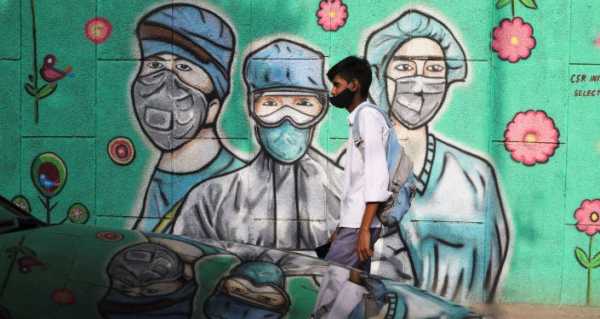
India has reported over 100,000 new infections in two of the last three days, marking the worst period for the country in the ongoing COVID pandemic. Being the third worst-hit country in terms of COVID infections, after the US and Brazil, New Delhi is facing a new wave of the disease in spite of its massive countrywide vaccination programme.
India logged over 115,000 COVID infections on Tuesday alone, setting a new record for the nation since the first case was reported on 30 January, 2020. The recent surge in COVID cases comes amid an ongoing government-backed vaccination drive, labelled one the largest in the world.
However, the recent rise in infections has led to many questions, including the effectiveness of the two vaccine candidates, their ability to deal with new COVID-variants from the United Kingdom (UK) as well as the need for another lockdown.
Sputnik talked to Dr. Sanjay Rai, a professor at the Centre for Community Medicine at India’s top hospital, All India Institute of Medical Sciences (AIIMS), New Delhi, and the chief investigator in the ongoing vaccine trials at the government-owned hospital.
Sputnik: Do you believe India has learnt its lessons from the first wave? How well is the government prepared in terms of medical infrastructure, to handle the record number of infections this time around?
Dr Sanjay Rai: Well, the health authorities in the country definitely seem to be in a better position than during the first wave last year. Since last year, India has diversified its internal capacities, both manufacturing as well as healthcare infrastructure.
When COVID hit India last year, we didn’t even have the facility to manufacture personal protective equipment (PPEs) kits, which had to be imported from other countries. We didn’t have an adequate number of beds to deal with the rising infections.
Gradually, the authorities increased the number of beds and created domestic manufacturing capabilities to boost production of various COVID-related equipment.
Similarly, the government has also updated the Standard Operating Procedure (SOP) for serious diseases since the first wave struck, so that those with comorbidities could be dealt with extra care in case of a COVID infection.
Sputnik: India has rolled out one of the largest vaccine drives in the world but we are still witnessing a record spike in infections. What is not going right?
Dr. Sanjay Rai: For the ongoing vaccine drive to start bearing fruit, we need to give it more time. It will take some time for the transmission dynamics of infection to alter.
We must look at the vaccine rollout programme in the larger context. India has so far managed to vaccinate 80 million people. Compared to other countries, India’s vaccine rollout initiative is one of the largest in the world. In terms of number of people vaccinated, India is behind only the US and China.
We must also factor in that in order to achieve herd immunity at a place, 50 to 60 percent of the people need to be vaccinated. India has so far vaccinated only 2 to 3 percent of its population.
Sputnik: Why is there a record spike in infections?
Dr. Sanjay Rai: Well, the number of infections at any given place is a multi-factor phenomenon. Most likely, we are witnessing a rise in infections due to the new COVID variant that is said to have come to India from the United Kingdom. Genome sequencing has proved the same.
As per available information, the new variant is infecting at a faster rate. Although, we are still not sure if it is leading to a more severe infection than the original COVID virus.
Having said that, I believe that India is yet to witness the worst of the pandemic. The next few weeks are crucial.
Sputnik: Is there a need for another lockdown? Are large public gatherings, or the ongoing elections in five states, contributing to the rising number of cases?
Dr. Sanjay Rai: The recent rise in infections is a country-wide phenomenon and not only in the election-bound states. However, large public gatherings, like the ones being seen in these states, are likely to be worsening the COVID situation. It is certainly not advisable to be in public gatherings when one is trying to keep from contracting an infection.
I believe that lockdown is not the solution, despite many experts calling for it in recent days due to the situation. We now have sufficient evidence to prove that lockdown didn’t help in combating the spread of COVID in the country.
Sputnik: How efficient are the two vaccine candidates currently being administered? There are reports that administering Covishield (jointly conceived by British pharmaceutical giant AstraZeneca and Oxford University) is leading to health complications, including fatal blood clots.
Dr. Sanjay Rai: Well, both the vaccine candidates approved by Drugs Controller General of India (DGCI) have been thoroughly vetted before being approved. As per available evidence, which has been peer-reviewed, Covishield has shown 70 percent efficacy, compared to 81 percent witnessed in the case of Covaxin (developed by Indian company Bharat Biotech).
As for reported health complications arising due to administering of Covishield, I would rather rely on robust scientific evidence and published literature before taking a call on its effectiveness.
I would like to point out here that efficacy, which is calculated in a controlled environment during clinical trials, is different from effectiveness of a vaccine, which is when it is rolled out for the masses.
There could be several logistical factors which could impact the effectiveness of the vaccine, including transportation and storage temperatures. India’s logistical infrastructure to transport the vaccine, which requires extremely low temperature, is not up to the mark. So, there could be several factors which may have been contributing to the health complications arising due to intake of Covisheild vaccine.
Sourse: sputniknews.com






